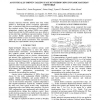Free Online Productivity Tools
i2Speak
i2Symbol
i2OCR
iTex2Img
iWeb2Print
iWeb2Shot
i2Type
iPdf2Split
iPdf2Merge
i2Bopomofo
i2Arabic
i2Style
i2Image
i2PDF
iLatex2Rtf
Sci2ools
103
click to vote
ICMCS
2006
IEEE
2006
IEEE
Acoustically-Driven Talking Face Synthesis using Dynamic Bayesian Networks
Dynamic Bayesian Networks (DBNs) have been widely studied in multi-modal speech recognition applications. Here, we introduce DBNs into an acoustically-driven talking face synthesis system. Three prototypes of DBNs, namely independent, coupled, and product HMMs were studied. Results showed that the DBN methods were more effective in this study than a multilinear regression baseline. Coupled and product HMMs performed similarly better than independent HMMs in terms of motion trajectory accuracy. Audio and visual speech asynchronies were represented differently for coupled HMMs versus product HMMs.
| Added | 11 Jun 2010 |
| Updated | 11 Jun 2010 |
| Type | Conference |
| Year | 2006 |
| Where | ICMCS |
| Authors | Jianxia Xue, Jonas Borgstrom, Jintao Jiang, Lynne E. Bernstein, Abeer Alwan |
Comments (0)

